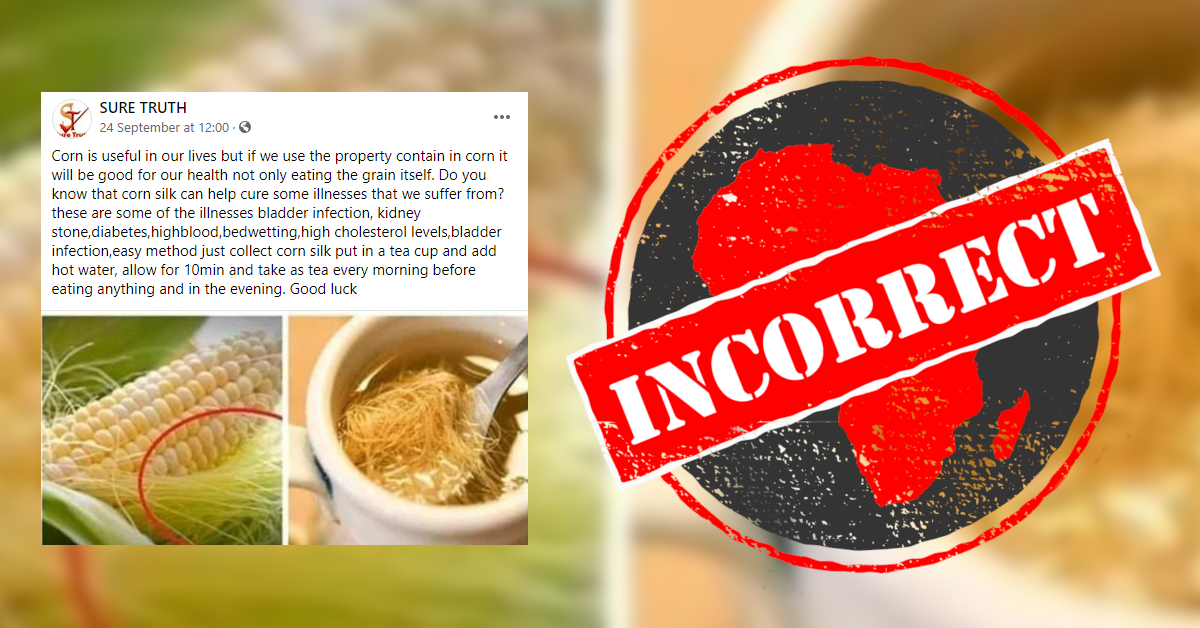“Do you know that corn silk can help cure some illnesses that we suffer from?” asks a message posted on Facebook in Nigeria in September 2020.
Some of the “illnesses”, it says, are “bladder infection, kidney stone, diabetes, high blood, bedwetting, high cholesterol levels [and] bladder infection”.
It then describes the “easy method” of curing these conditions: “Just collect corn silk put in a teacup and add hot water, allow for 10min and take as tea every morning before eating anything and in the evening.”
Corn silk is the long, thread-like strands of plant material that grow underneath the husk of an ear of corn, also known as maize. Does it cure a range of conditions?

Jacob Awobusuyi, a professor of medicine in the clinical sciences faculty of Lagos State University’s college of medicine, told Africa Check that there was “no substance to the claim”.
“Corn silk cannot be used to treat or cure diabetes, high blood pressure and high cholesterol. People should ignore the claim,” he said. “People with these health conditions shouldn’t treat them lightly.”
Olutayo Alebiosu, a professor of medicine at Osun State University’s faculty of clinical sciences, described the claim as “frivolous”.
“Such a claim makes no sense. Corn silk cannot be used to treat a bladder infection, kidney stone and bedwetting. My advice to people with the listed health conditions is that they shouldn’t look for a cheap way out. Visit a doctor for proper treatment.” – Motunrayo Joel
Some of the “illnesses”, it says, are “bladder infection, kidney stone, diabetes, high blood, bedwetting, high cholesterol levels [and] bladder infection”.
It then describes the “easy method” of curing these conditions: “Just collect corn silk put in a teacup and add hot water, allow for 10min and take as tea every morning before eating anything and in the evening.”
Corn silk is the long, thread-like strands of plant material that grow underneath the husk of an ear of corn, also known as maize. Does it cure a range of conditions?

‘Visit doctor for proper treatment’
Jacob Awobusuyi, a professor of medicine in the clinical sciences faculty of Lagos State University’s college of medicine, told Africa Check that there was “no substance to the claim”.
“Corn silk cannot be used to treat or cure diabetes, high blood pressure and high cholesterol. People should ignore the claim,” he said. “People with these health conditions shouldn’t treat them lightly.”
Olutayo Alebiosu, a professor of medicine at Osun State University’s faculty of clinical sciences, described the claim as “frivolous”.
“Such a claim makes no sense. Corn silk cannot be used to treat a bladder infection, kidney stone and bedwetting. My advice to people with the listed health conditions is that they shouldn’t look for a cheap way out. Visit a doctor for proper treatment.” – Motunrayo Joel
Republish our content for free
For publishers: what to do if your post is rated false
A fact-checker has rated your Facebook or Instagram post as “false”, “altered”, “partly false” or “missing context”. This could have serious consequences. What do you do?
Click on our guide for the steps you should follow.
Publishers guideAfrica Check teams up with Facebook
Africa Check is a partner in Meta's third-party fact-checking programme to help stop the spread of false information on social media.
The content we rate as “false” will be downgraded on Facebook and Instagram. This means fewer people will see it.
You can also help identify false information on Facebook. This guide explains how.





Add new comment